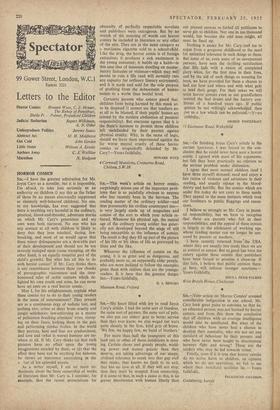Letters to the Editor
Horror Comics Howard Wyce, C. J. Hewart,
Sheila Pt Pahner, Prejudiced Children The Bishop of Pontefract, Rupert Wilkinson, Judicial Barbarism
A. N. Other Undergraduate Poll tics Jeremy Isaacs Abstract Art M. H. Middleton John Gordon Out Cold William A. Kessler Little Sister C. J. Walliker Anchors Away N. Hodgson Marathon HORROR COMICS
SIR,—I have the greatest admiration for Mr. Joyce Cary as a novelist; but it is impossible, I'm afraid, to take him seriously as an authority on children (I say this as the father of three by no means abnormally suppressed or sinisterly well-behaved children). No one, to my knowledge, has ever suggested that there is anything very harmful in the ordinary, piratical, blood-and-thunder, adventure stories on which Mr. Cary's generation and my own were both nurtured. No one who has any contact at all with children is likely to deny that they love mischief, daring, law- breaking, and most of us would agree that these minor delinquencies are a desirable part of their development and should not be too severely stamped upon (some stamping, on the other hand, is an equally essential part of the child's growth). But what has all this to do with horror comics? If Mr. Cary thinks there. is any resemblance between these raw chunks of pornographic viciousness and the time- honoured talcs of noble outlaws which de- lighted his own youth and mine, he can never have set eyes on a real horror comic.
May I, for his enlightenment, explain what these comics try to do to their young readers in the name of entertainment? They present sex as a continuous orgy of sadistic lust, and nothing else; crime as sheer brute cruelty and jungle selfishness; law-enforcing as a matter of policemen breaking criminals' arms, stamp- ing on their faces, kicking them in the guts and performing similar frolics. In the world they portray, hate and fear are predominant, and love and (what is worse) humour are no- where at all. If Mr. Cary thinks (a) that such pictures have no effect upon the young imaginations assailed by them, or (k) that the effect they have can be anything but hideous, he shows an innocence astonishing in the a hor of his splendid novels.
As a writer myself, I am no more en- thusiastic about the State censorship of works of literature than Mr. Cary is. I consider, for example, that the recent prosecutions for obscenity of perfectly respectable novelists and publishers were outrageous. But by no stretch of the meaning of words can horror comics be included in literature or any other of the arts. They are in the same category as
a marijuana cigarette sold to a school-child.
Like the drug, the horror comic is of foreign extraction; it produces a sick excitement in the young consumer; it builds up a habit—in this case that of insensate dwelling on mastur- batory fantasies or violence—which may well persist to ruin a life (and will certainly ruin any capacity for ordinary literary enjoyment); and it is made and sold for the sole purpose of profiting from the debasement of human nature to a work than bestial level.
Certainly parents who cannot guard theil children from being harmed by this muck art to be despised (I cannot see that teachers arc at all to be blamed, if their pupils' homes are tainted by the modern abdication of parental responsibility). But everyone agrees that it is the State's business to protect those children left undefended by their parents against physical cruelty. Why, in the name of logic, should we leave them unprotected against the
far worse mental cruelty of these horror comics so' misguidedly defended by Mr. Cary?—Yours faithfully,
HOWARD WYCE 4 Cornwall Mansions, Cremorne Road, Chelsea, S.W.I0










































 Previous page
Previous page